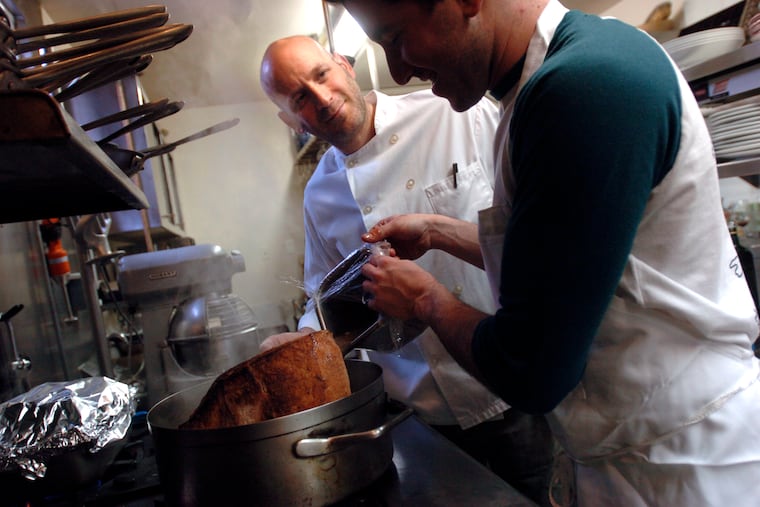From the archives: How Marc Vetri was inspired to reconnect with his Jewish roots
After a death in his restaurant family, Marc Vetri prepared a Passover seder at his namesake Philadelphia eatery.

This article was originally published April 14, 2005.
The story of the Passover seder at Vetri is an unconventional one. To begin with, there will be no matzo balls. But the matzo itself will be homemade.
And there will be, as one would expect from one of the city’s leading Italian chefs, a Mediterranean accent to the meal. At which, we must add, there will be no paying customers — only close friends and family.
That Marc Vetri should host a private seder at all (for the second year) might come as a surprise to patrons who have seen the special joy on his face when he cranks the antique prosciutto slicer in the dining room.
Vetri will be the first to admit he is not an observant Jew. But his enthusiasm for cooking seder, the traditional meal celebrating the Jews' exodus from Egypt, reflects a recent cultural awakening. It was due, he says, to a combination of events, new friendships, and an eye-opening trip to Israel. It took root with tragic news on Oct. 6, 2003.
Every restaurant is a kind of family, and that's especially true in a place as intimate as Vetri's 35-seat townhouse eatery. But when Vetri received a distraught phone call from his sous chef, Michael Solomonov, that October day, something more clicked in, something deeper than the usual kitchen bonds forged in the nightly heat of producing haute cuisine.
Solomonov said his younger brother, David, had just been killed in Israel by a sniper on the Lebanese border, only days before his release from the Israeli Army.
“And he [David] was going to come to Philly,” Vetri said.
Instead, Vetri accompanied Michael Solomonov to Israel three months later. There the chefs prepared a New Year's Day feast for David 's brigade as a tribute to him. The dinner, served on Israel's northern border not far from the apple orchard where he died, was called "a meal to remember" by the Jerusalem Post.
For Vetri, the journey was one of powerful self-discovery.
"Marc really awakened himself to who he is by going to Israel," said his business partner and maitre d', Jeff Benjamin.
As for Solomonov, the trip solidified the bond with his colleagues: "Jeff's and Marc's families really became my family after Dave. "
The decision to make Passover seder together at the restaurant, Solomonov said, "was just another part of it. And it meant a lot. "
Observing seder meant closing the restaurant for a night, but if there is one Jewish holiday a restaurant can rally around, it is the food-centric time of Passover.
At least Benjamin, the son of a rabbi, wouldn't have to endure another year of guilt about not going home to celebrate the holiday with his widowed mother. She would come to Philadelphia from Long Island, N.Y.
Also on the guest list was Vetri's extended family, Solomonov 's mother from Israel, and the family of Ofer Shlomo, an Israeli-born contractor who has become one of the restaurant's closest friends.
In all, a packed house of 32 gathered last spring for an evening of stories, songs and vibrant flavors, a hodgepodge of family recipes that reflected a Sephardic bent rather than the Eastern European Ashkenazi flavors more common in American seders. It became an instant tradition.
There were whole legs of lamb, slow-roasted and smoked over smoldering oak logs in the open fire pit Shlomo had built for the restaurant. There were steamed artichokes stuffed with matzo meal, which Vetri adapted from an old Sicilian recipe. An Italian dish called carpione — white fish seared then marinated in vinegar — stood in for the usual gefilte. Apple haroset was spiked with sweet Italian recioto wine, not Manischewitz.
Solomonov cooked his mother's brisket, traditional in most ways except for a cup of espresso that adds an intriguing shade of bitter darkness to the sweet oniony gravy.
And then there was the soup.
Vetri has never liked traditional matzo balls, so the pros happily stepped aside for Shlomo's wife, Michelle, who prepared her family's Yemenite chicken soup. It is essentially a simple chicken-in-the-pot, but is evocatively curried with turmeric, cumin and fresh cilantro.
Enthusiasts garnish it with a jolt of spicy harissa and an optional spoonful of hilbah, the whipped puree of fenugreek seeds that is notorious for its pungent odor.
It wouldn't be too much of a stretch to imagine matzo balls floating in Yemenite soup. But Shlomo prefers the Yemenite tradition of fatoot, in which sheets of matzo are folded and crumbled into the broth.
"And Marc makes the best matzo! " Shlomo says.
Made with bread flour, the dough is rolled through the pasta machine and cooked quickly on a hot stone in the restaurant's oven. These delicate flatbreads are one of the few elements in the Vetri seder that are not kosher for Passover.
But no one here is complaining. This year's seder will be as big as ever.
“I still don’t consider myself religious,” Vetri said. "But I’ve always wanted to do something. And having the whole family here is nice. "